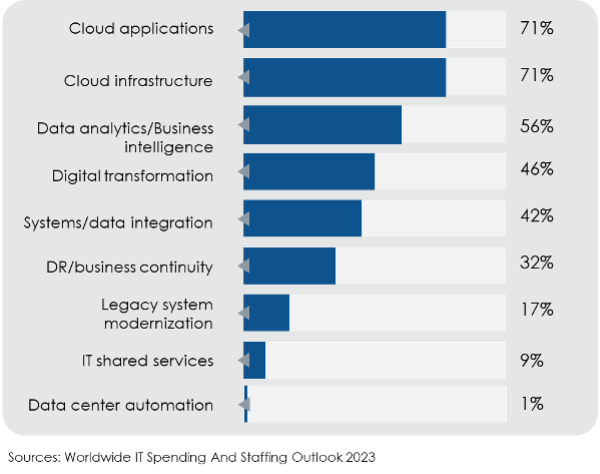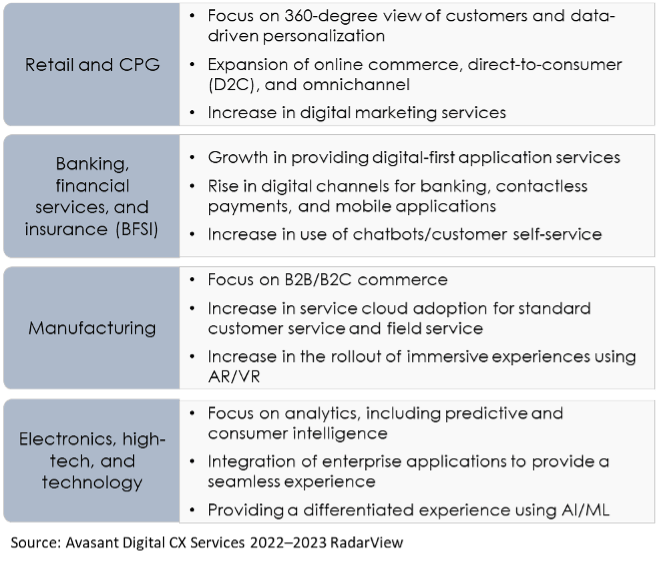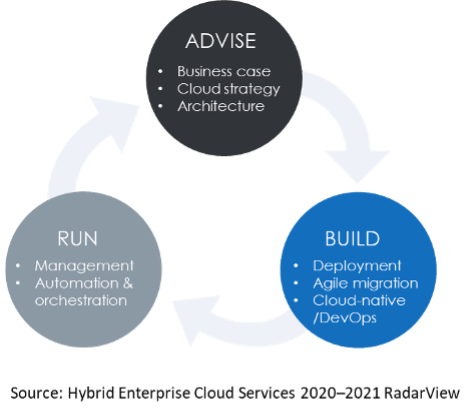Over the past 12–18 months, customer-facing functions, enterprise applications, and processes have changed tremendously. There has been an uptake in digital channels, direct-to-consumer (D2C) commerce, omnichannel digital communications, and SaaS-based application services. The period has also witnessed a rise in preference for data and AI-driven, personalized, and automated experiences.
This research byte showcases how customers’ quest for enhanced personalization and seamless experiences has increased the demand for SaaS-based solutions addressing industry-specific business needs and how service providers are facilitating this transformation in North America. We highlight the efforts of one such service provider, TCS, based on its recent analyst day in June 2023.
Thriving in Times of Uncertainty
Enterprises continuously seek ways to improve technology, optimize processes, and move to a higher velocity operating model to deliver personalized products and services to their customers. The adoption of cloud and SaaS-based tools, AI, and advanced analytics-powered solutions are the primary drivers of these pursuits.
In our Worldwide IT Spending And Staffing Outlook 2023, we highlighted cloud remains the top spending priority by IT initiative, with 71% of enterprises increasing their outlay in cloud applications and infrastructure (see Figure 1 below). Cloud applications continue to be increasingly popular alternatives to traditional, on-premises systems, with financial systems, ERP, and corporate performance management joining CRM and human capital management (HCM) systems as attractive applications to move to the cloud. This is followed by data analytics, business intelligence, and digital transformation spending.

Figure 1: Spending priorities by IT initiative
However, given that the macroeconomic situation continues to be challenging and uncertain and has already seen a recessionary impact on the CIOs’ budget, enterprise customers must tread a narrow path as they continue to drive growth and transformation initiatives focusing on cost optimization.
At the recently held TCS analyst event in Boston themed “Innovate, Adapt, Thrive,” TCS business leaders, including the Chairman of TCS North America, TCS Presidents, CHRO, and CTO, articulated how the company is partnering with its clients in their transformation journeys, driving innovation at scale. The theme primarily echoed today’s customers’ need to rebalance cost optimization and innovation.
Various industry leaders at the event showcased how industry-specific AI and cloud-based products and platforms are anchoring their market strategy. For businesses using caution in the last renewal cycle and looking to consolidate their vendor contracts, these SaaS-based solutions provide flexibility to modernize and innovate one technology capability or business use case at a time. This also offers the benefit of having industry-specific content solutions, ensuring content privacy, and meeting changing regulatory requirements of the sector.
Over the past three years, TCS has invested in this direction and has increased its revenue share in North America from 50% in FY 2021 to 53% in FY 2023, growing at a 16.5% CAGR. Of the 350 new clients added in the past three years, 130 were acquired last year. It has hired over 26,000 associates in North America, including more than 4,500 hires from universities, primarily to scale its consulting practice bringing digital and industry expertise.
K. Krithivasan, the recently appointed CEO and MD of TCS, in his welcome note, highlighted how TCS is partnering with its customers to speed up and scale its innovation efforts by leveraging its investments in R&D. TCS now has five Pace PortsTM globally, including the two new Pace Ports in Pittsburgh and Toronto, through which it aims to drive co-innovation with its enterprise customers and partners and discover new business opportunities for future growth by testing newer technologies.
Cloud-Enabled Industry Transformation
Cloud has progressed from simply being a tool enabling infrastructure and application migration to becoming a means for improving application performance and achieving cost optimization. Rapid development and deployment of cloud-native applications using CI/CD automation, DevOps, and containers/microservices is increasing, focusing on business outcomes.
President of Enterprise Growth Business (TCS) Krishnan Ramanujam defined this transition in cloud usage as a journey from Cloud 1.0, which was technology-focused, to Cloud 2.0, which is business-focused, with customer experience at the core.
With customers seeking more personalization and seamless experiences, the demand for industry-specific SaaS-based solutions addressing specific business challenges has seen an increase. This includes solving use cases such as contextual and contactless payments in the BFSI industry, innovative digital channels, supply chain and operations efficiency in retail and CPG, and drug safety and surveillance in the healthcare and life sciences industry.

Figure 2: Key consumer trends impacting top industries
TCS is riding the SaaS trend through its portfolio of solutions, including TCS BaNCSTM, TCS OmniStoreTM, TCS OptumeraTM, TCS ADDTM, and TCS AvianaTM, to address industry-specific needs. Also, TCS CognixTM, TCS CrystallusTM, and TCS ignioTM are being continuously leveraged by its customers in their transformation journeys.
Interestingly, TCS witnessed a 50% increase in large transformation programs leveraging Cognix as the enterprise customers embraced cloud and AI for application modernization across finance, supply chain management, HCM, and customer experience.
Pursuit of New Solutions
As service providers address the current market needs, there is an equal focus on innovation and the cocreation of new solutions. Advancements in AI are providing new automation capabilities, such as deep learning and generative AI, to automate complex, data-driven tasks with high accuracy. Cognitive bots can now process unstructured data, recognize patterns, and make more informed decisions regarding workflows previously considered too complex for automation.
TCS has been driving its innovation agenda through its COIN and Pace programs, collaborating with startups, academia, alliance partners, and marquee customers to address emerging use cases. For instance, it has developed 50 prebuilt use cases in partnership with Google and is its launch partner for enterprise generative AI.
As highlighted in the Avasant Intelligent Automation Services 2022–2023 RadarView, we expect an increase in the use of edge computing for real-time automation use cases, low-code platforms for rapid modification and iteration of hyperautomation workflows, and digital twin for automation workflow testing in the next 12 months.
Krishnan talked about how TCS partnered with Saipem to cocreate a digital twin platform for vessels to help optimize drilling operations through simulations and enable predictive maintenance. It not only reduced costs and improved safety and productivity but also lowered the carbon footprint.
Investments and innovations led by TCS are spread across industries, covering the entire range of the development cycle — discover (new formulas in the case of healthcare and life sciences), design (processes in oil and gas), manufacture (reduction of emissions and plant optimization), operate (optimization of blast furnace operations using digital twin), and end of life (reduction of food wastage using AI).
TCS Fellow and Chief Services Innovation Officer Dr. Harrick Vin elaborated on “digital skin,” a new computer model developed for a leading consumer goods company. This solution reduces the need for animal testing. It allows scaling the number of clinical tests, thereby enhancing the design formulations and eventually reducing the release cycle time
The Way Forward
As customers seek to consolidate contracts and rationalize their multivendor models, this trend promises to favor service providers covering the full spectrum of the cloud life cycle (see Figure 3 below). Progressive service providers continue to augment their portfolio and develop new IPs/assets that help enterprises to assess, design, and simulate cloud solutions and provide a customized cloud road map.

Figure 3: Enterprise cloud life cycle
Secondly, it implies that service providers change how they approach enterprise customers and move from an implementation-centric model to an integrated service model that calls for a consultative approach to sales and solutions delivery. This requires service providers to bring in consulting professionals with specific domain experience and work with sales and delivery executives to manage key accounts.
With its Cloud 2.0 strategy, TCS seems poised to take advantage of the current market scenario by leveraging end-to-end digital and cloud services and a contextual consulting-led approach.
Postscript:
Following TCS’s analyst day on June 12-13, and the publication of Avasant event byte, TCS made several changes to its designated senior management team on July 29, 2023, as per disclosures to the stock exchanges. Per our checks and understanding, this aligns the organization to a vertical-based operating structure bringing existing Industry Solutions Unit (ISUs) along industry segments into key business groups. We believe with these changes, TCS is trying to further deepen customer centricity, to drive additional growth in the business.
By Gaurav Dewan, Research Director, Avasant





